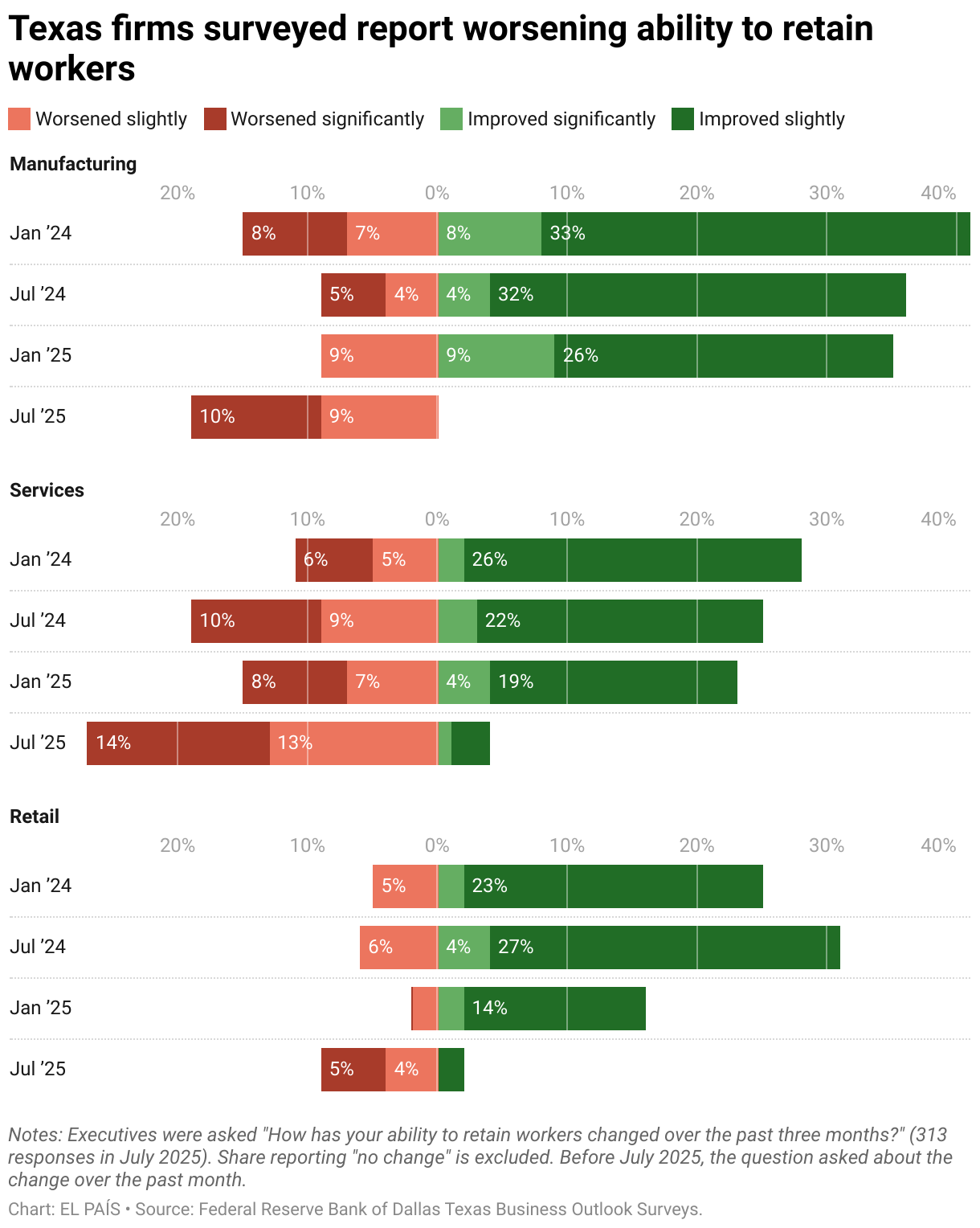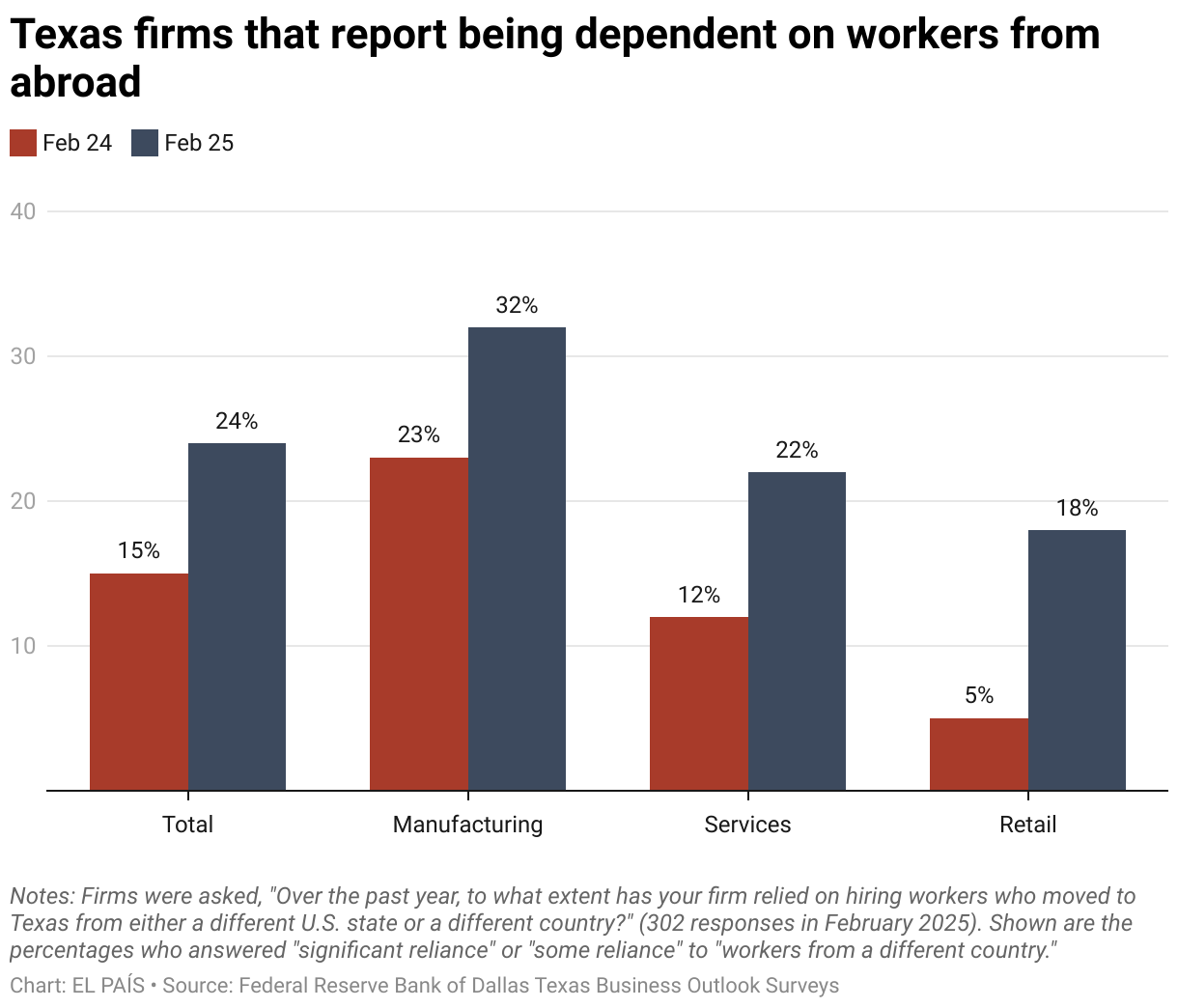The Texas labor market faces a paradox: as businesses increasingly rely on foreign workers, the Trump administration’s immigration policies are making it difficult to retain them. A study by the Dallas Federal Reserve reveals that this is limiting job growth in the state. According to the research, based on the local Business Outlook Surveys, one in four Texas companies currently relies on migrant labor, representing an increase of nearly 10% compared to the previous period.
Unlike in other years, when the main concern was hiring new staff, companies are now struggling to retain existing employees. Surveys from last July revealed that 13% of companies surveyed reported a deterioration in their ability to recruit or retain workers, while only 2% reported improvements. The hardest hit sectors are manufacturing, services, and retail.
The White House’s new immigration policies have a direct impact on this issue. Four out of 10 businesses reporting difficulties say their employees have missed work at some point for fear of Immigration and Customs Enforcement (ICE) raids. “Residents and contractors with legal status issues, who have been working normally for years, are suddenly terrified,” said one real estate professional. “They’re quitting, hiding, avoiding places they used to frequent, and refusing to travel.”

Meanwhile, a tourism office executive explained that “the hotel industry relies on labor-intensive jobs: cleaning, gardening, food, and beverages.” However, he said, “many employees are now afraid to show up.” A retailer added that he has noticed “a drop in sales to foreign customers” and “a periodic decrease in the number of buyers due to ICE raids in the area.”
Furthermore, nearly 60% of affected businesses say they cannot hire qualified workers because they lack work permits or legal status. Another 49% report a drop in job applications from foreign-born individuals. Furthermore, the Texas Federal Reserve warns that its surveys likely underestimate the real impact, since they do not include sectors that rely heavily on immigrant workers, such as construction or agriculture.
Between 2021 and 2024, Texas absorbed nearly 10% of the national migration increase. Many of these migrants, beneficiaries of temporary work permits, legally entered the labor market, helping companies fill vacancies, especially during the pandemic recovery. These conditions have been reversed by new restrictions, including work permit revocations, leaving companies in a vulnerable position.
Faced with the difficulty of hiring or retaining migrant workers, affected businesses have implemented emergency strategies. The most common is to increase their employees’ working hours, a measure that increases productivity in the short term but causes fatigue and deteriorates quality of life. Other companies have attempted to compensate with salary increases and additional benefits, in addition to attempting to hire U.S. citizens and legal residents. Regarding the latter, the document warns that it is a limited solution. “If these workers were easily accessible, companies would have hired them from the beginning,” the report explains.

Likewise, 20% of the affected companies are considering resorting to temporary visa programs, although with little optimism. “The visa programs are almost impossible to navigate and expensive,” said a services sector executive. “Furthermore, we fear that companies that hired illegally before will now seek out our employees and drive up wages,” he added.
A quarter of the surveyed firms already rely on contractors or outsourcing, and 3% have begun moving operations abroad. “Part of our workforce is on H-1B visas,” said one entrepreneur. “The uncertainty and revocations have paralyzed labor mobility. Many companies prefer to avoid risk and move work abroad. And that work probably won’t come back.”
For years, employment in Texas grew above the national average, driven by both domestic and international migration. However, with the new immigration restrictions, the growth rate fell below its historical trend of 2% per year. The question, according to the Federal Reserve, is whether this slowdown reflects a drop in demand or a contraction in labor supply. The data points to the latter: the unemployment rate remains low (4.1%), job openings remain stable, and wages are growing, so demand persists, although it cannot be met.
According to the study, the reduction in the migrant workforce might not increase unemployment, but it might slow economic growth. By 2031, the Federal Reserve expects all U.S. population growth to come from immigration. “Current policies are not only shaping the present Texas labor market, but also the limits of its future growth,” the study concludes.
Sign up for our weekly newsletter to get more English-language news coverage from EL PAÍS USA Edition

